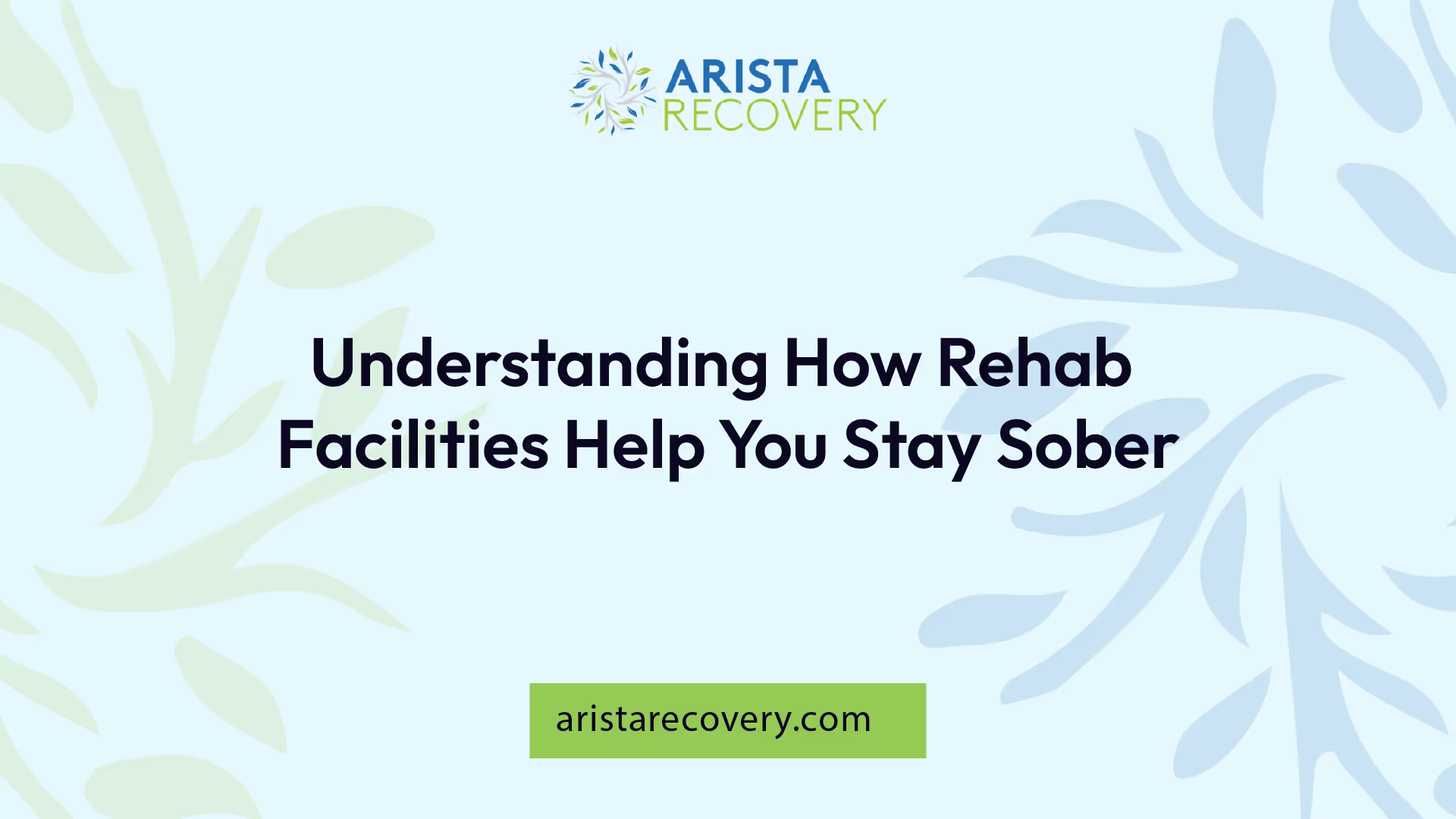Understanding How Rehab Facilities Help You Stay Sober

Therapeutic Approaches
Rehab facilities provide various therapeutic approaches to assist individuals in maintaining sobriety. These methods focus on addressing the psychological aspects of addiction and offering tools for recovery.

Cognitive Behavioral Therapy (CBT)
Cognitive Behavioral Therapy (CBT) operates on the principle that psychological problems, such as addiction, stem from negative thinking patterns. These patterns contribute to self-destructive behaviors. CBT helps individuals recognize and alter these thoughts with realistic approaches, which can lead to sustained sobriety.
CBT is widely utilized in addiction recovery, as it not only addresses harmful drug or alcohol use but also equips individuals with essential skills for their recovery journey. This method incorporates specialized treatment techniques, such as behavioral contracting and relapse prevention, to enhance self-control and improve overall treatment outcomes [1].
Key Elements of CBTDescriptionRecognition of Negative ThoughtsIdentifying harmful thought patterns.Changing BehaviorModifying self-destructive behaviors through realistic thinking.Skills for RecoveryEquipping individuals with necessary life skills.
Contingency Management
Contingency management is a behavioral therapy that incentivizes individuals for achieving positive milestones in their recovery journey, such as maintaining sobriety. This method employs positive reinforcement strategies to enhance the likelihood of sobriety.
Rewards can vary, including vouchers for negative drug tests or improvements in personal relationships. By associating sobriety with tangible benefits, individuals are more likely to engage in positive behaviors.
Rewards in Contingency ManagementPurposeVouchersEncourages attendance in programs and sobriety verification.Relationship ImprovementsBuilds a support network and motivates sober behaviors.
Rational Emotive Behavior Therapy (REBT)
Rational Emotive Behavior Therapy (REBT) emphasizes identifying and rectifying negative thought patterns and beliefs that influence harmful behaviors. This therapy aids individuals by helping them replace irrational beliefs with more logical and constructive thoughts, ultimately supporting their addiction recovery.
Key Concepts of REBTDescriptionIdentifying Irrational BeliefsPinpointing faulty thought patterns that lead to addiction.Replacing with LogicEncouraging more rational thought processes.
Motivational Interviewing
Motivational Interviewing focuses on encouraging individuals to uncover their intrinsic motivations for wanting to stay sober. This method is less directive and allows clients to articulate their desires for recovery, fostering internal change and commitment to the sobriety journey [2].
Aspects of Motivational InterviewingDescriptionIntrinsic MotivationHelping clients find their personal reasons for sobriety.Encouraging Internal ChangeSupporting self-driven commitment to recovery.
These therapeutic approaches are vital in the process of addiction recovery, providing individuals with the skills and motivation necessary to achieve lasting sobriety.

Family Involvement in Treatment
Family involvement plays a crucial role in addiction treatment and recovery. By engaging family members in therapy and building supportive networks, rehab facilities help individuals stay sober and foster a healthier environment for recovery.
Importance of Family Therapy
Family therapy is essential in addiction treatment, as it addresses substance abuse issues within the context of family dynamics. By including affected family members, the therapy aims to improve relationships, reduce stress, and create a supportive atmosphere for continued abstinence [2]. This approach helps family members better understand addiction as a disease, recognize potential relapse triggers, and learn how they can effectively support their loved ones through the recovery process.
Key Benefits of Family TherapyDescriptionImproved RelationshipsStrengthening familial bonds reduces stress and creates a more stable support system.Understanding AddictionFamily members gain insights into addiction and its impacts.Enhanced CommunicationOpen discussions foster healthy communication within the family.Stress ReductionTherapy helps address family-related issues that may contribute to stress.
Family counseling and therapy sessions provide a safe space for discussing feelings and concerns. They equip families with the tools necessary for supporting their loved ones in recovery and helping to mitigate the chance of relapse.
Building Supportive Networks
Establishing a social support network is crucial during recovery. This network helps individuals reconnect with previously damaged relationships, surround themselves with healthy, sober individuals, and express their thoughts and feelings openly.
Having a robust support system offers several advantages:
Advantages of Support NetworksDescriptionReduces IsolationProvides companions who understand the struggle, eliminating feelings of loneliness.Offers SupportFriends and community members can assist during challenging times and cravings.Encourages Healthy BehaviorsPositive peer pressure promotes sober behavior and decision-making.Expands OpportunitiesAccess to activities and social events that foster sobriety and well-being.
Research indicates that a strong support network is essential for individuals in recovery. These networks help prevent feelings of isolation and provide essential assistance during difficult moments, making it easier to manage cravings and emotions [4]. Furthermore, social support networks can help reduce the stigma associated with substance abuse, allowing individuals to connect with others who have successfully overcome addiction and share their experiences.
Family involvement and a supportive network significantly enhance the recovery journey, making rehabilitation facilities key players in helping individuals maintain sobriety.
Length of Treatment
Treatment duration plays a significant role in the recovery process. Research supports a correlation between longer lengths of time in treatment and improved outcomes. Addressing the full range of a patient’s unique problems and needs is essential for effective treatment.
Impact on Treatment Outcomes
Patients who remain in treatment for longer durations tend to achieve maximum benefits. A treatment episode lasting three months or longer often predicts a successful outcome. Studies indicate that patients in substance abuse treatment who maintain abstinence for two years are likely to remain drug- and alcohol-free for ten years, with almost 90% achieving this milestone [1].
The table below illustrates the relationship between treatment duration and long-term recovery success:
Treatment DurationSuccessful Long-Term Recovery (%)Less than 3 monthsVaries significantly3 to 6 monthsGreater than 50%6 months to 1 yearApproximately 75%2 years or moreNearly 90%
Factors Influencing Success
Several factors influence the success of addiction treatment, including:
Personalized care is also crucial in the recovery process. Tailoring treatment plans to address underlying causes of addiction, coexisting mental health issues, and environmental influences has been shown to lead to decreased relapse risk and improved overall outcomes. Individuals receiving personalized care often fare better than those in generalized treatment programs.
Professional Support in Recovery
Professional support plays a crucial role in recovery from addiction. Treatment facilities not only provide therapeutic interventions but also incorporate medication management to address both the mental and physical aspects of addiction.
Comprehensive Treatment Programs
Comprehensive treatment programs in substance abuse centers aim to assist patients in achieving and maintaining abstinence, which is essential for long-term recovery success. These programs typically involve a combination of educational resources, counseling, and self-help groups that emphasize reducing risky behaviors and building supportive relationships.
Key Components of Comprehensive Treatment Programs:
ComponentDescriptionEducationUnderstanding addiction and recovery processes; managing triggersCounselingIndividual and group sessions to address underlying issuesSelf-Help GroupsParticipation in support groups for shared experiences and encouragementLifestyle AdjustmentsGuidance on creating healthier habits and environments
Professional treatment can help manage both the psychological and physical factors of addiction to promote recovery. Research shows that treatment for substance dependence often leads to reduced compulsive drug use and less severe relapse episodes, indicating the effectiveness of these intervention strategies.
Role of Medications
Medications are instrumental in the treatment of substance abuse. They can help to manage withdrawal symptoms, reduce cravings, and support overall recovery efforts. Pharmacological methods are often integrated into treatment programs to promote and sustain recovery while aiming to minimize relapse.
Common Medications Used in Addiction Treatment:
MedicationPurposeMethadoneReduces opioid cravingsBuprenorphineAlleviates withdrawal symptomsNaltrexoneBlocks effects of opioidsDisulfiramDeterrent for alcohol use
Patients in substance abuse treatment who remain abstinent for two years are significantly more likely to maintain drug- and alcohol-free status over the long term. The combination of comprehensive treatment programs and appropriate medication management is vital for individuals seeking to reclaim their lives from addiction.
Employment and Recovery
Access to employment plays a crucial role in the recovery journey for individuals overcoming addiction. Rehab facilities often utilize specific strategies to support this process, such as Individual Placement and Support (IPS) and second-chance protocols.
Individual Placement and Support (IPS)
The Individual Placement and Support (IPS) model is a proven approach designed to assist individuals in recovery from Substance Use Disorder (SUD). Initially developed for those with mental health conditions, IPS has been adapted to support individuals in their employment endeavors. This model pairs individuals in early recovery with employment specialists who work directly with employers to ensure a successful transition into the workforce.
The key features of the IPS model include:
FeatureDescriptionEmployment SpecialistsDedicated personnel who help individuals identify job opportunities and prepare for interviews.Collaboration with EmployersBuilding partnerships with businesses to create a welcoming environment for hiring individuals in recovery.Supportive EmploymentProviding ongoing support to ensure job retention and navigate any challenges that arise in the workplace.
The U.S. Department of Veterans Affairs, various states, and non-profit organizations have implemented IPS as a critical resource for promoting a recovery-ready workforce. Evidence has shown that employment itself acts as a form of recovery capital, improving overall well-being for individuals in recovery [6].
Second-Chance Protocols
Second-chance protocols represent an important strategy for creating inclusive employment opportunities for those in recovery. These protocols encourage employers to consider applicants with a history of substance use disorders or criminal records, recognizing that many individuals are deserving of the opportunity to start anew.
Key aspects of second-chance protocols include:
AspectDescriptionFair Hiring PracticesImplementing policies that prioritize the skills and potential of applicants over their past mistakes.Training and SupportOffering programs that enable individuals to develop job-specific skills and provide orientation for workplace integration.Removing BarriersReducing obstacles that often prevent individuals in recovery from securing jobs, such as stigma and discrimination.
These protocols not only support individuals in finding and maintaining employment but also foster a culture of inclusion and understanding within the workplace. This approach aligns with research that emphasizes the significance of employment stability in promoting long-term sobriety and recovery [6].
By focusing on these employment strategies, rehab facilities contribute to reinforcing individual recovery journeys, fostering both personal growth and community reintegration.
Strategies for Relapse Prevention
Relapse prevention is an essential component of addiction recovery. Rehab facilities implement various strategies to help individuals maintain their sobriety. Two critical aspects of these strategies are self-care practices and participation in support groups.
Self-Care Practices
Self-care practices play a vital role in preventing relapse. Individuals are encouraged to adopt a routine that promotes physical, mental, and emotional well-being. Some effective self-care strategies include:
Support Group Participation
Participation in support groups fosters a sense of community and accountability among those in recovery. It provides a platform for sharing experiences, struggles, and successes. Here are key benefits of support group participation:
By incorporating self-care practices and actively participating in support groups, individuals can effectively navigate the challenges of recovery and reduce the chances of relapse. These strategies are crucial for establishing a sustainable path toward long-term sobriety.
References
[2]:
[3]:
[4]:
[5]:
[6]:
[7]:
You’re not alone in this.
When mental health challenges and addiction intersect, it can feel isolating. At Arista, we offer compassionate, evidence-based, and trauma-informed care to help you heal, grow, and move forward.
You’re not alone in this.
When mental health challenges and addiction intersect, it can feel isolating. At Arista, we offer compassionate, evidence-based, and trauma-informed care to help you heal, grow, and move forward.
Support that moves with you.
You’ve taken a brave first step. At Arista Recovery, we’re here to help you continue with best-in-class care designed for long-term healing and support.
.webp)






